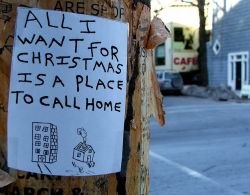Halifax Media Co-op
News from Nova Scotia's Grassroots
Christmas on Low Income
Christmas is supposed to a joyful, happy time of year. The way I was brought up, celebrating with family and friends are important.
Often, this celebration comes with a cost, one that middle and upper class people take for granted.
Well-off families are able to afford the cost of buying toys, brand name clothing and other presents to give their children for Christmas.
The children of poor families, on the other hand, only get handouts from charities and organizations. Money for these comes from the annual Christmas telethons and other local fundraisers that begin in early December.
More than a matter of gifts, not all people living in poverty can spend Christmas with their families because their relationships with their families have deteriorated due to their income level.
Even for people with better relationships with their families, some cannot afford the cost of transportation for travelling to their out-of-town family members’ homes for Christmas.
The Department of Community Services does not give any special allowance at this time of year for an income assistance client to cover Christmas expenses.
Feed Nova Scotia does have a Christmas Support Program for those who need extra help during the holidays, for which I receive a letter every year. However, this program does not provide enough help to solve all problems which low-income people face at Christmas, especially covering all expenses involved for this time of year.
From my personal experience of knowing the poverty community in the HRM, low-income people seem to spend Christmas the best way they know how. What this means can vary person to person.
Those who feel socially isolated usually end up being alone for Christmas, which is not a good feeling especially for this time of year. They may even brush aside the holidays, meaning they don’t end up celebrating much.
Others spend their Christmas holidays volunteering at holiday dinners, food banks and other events put on by local churches.
Some of the people who live in poverty and regularly attend church on Sunday even get invitations to spend Christmas Day with people they know through the church they attend. And some get invitations to attend Christmas dinners at the homes of people they know through other means.
It is a blessing for those living in poverty who get these invitations because Christmas is the time of year a person is suppose to show forgiveness, passion and generosity.
As someone who lives in poverty, I want to emphasize how fortunate I am when it comes to the Christmas season. I am fortunate to have a good relationship with my family; I am fortunate to get to spend a few days over Christmas with my brother, sister-in-law, niece and nephew. I love having the opportunity to watch my niece and nephew open their presents on Christmas morning.
However, I do have a hard time coming up with money every year to buy Christmas presents for my family. That is one main thing that people on a low income get stressed out about at this time of year: Where are we going to get money to cover these extra holiday expenses? For those who do not have a consistent flow of spending money, it is downright difficult for them to find the cash to cover more than the year-round, day-to-day expenses.
I am lucky to have a family that will always find ways to include me for the Christmas holidays. Some people who live in poverty are not as fortunate, nor do they live an easy life year-round. It is important not to only focus on making Christmas easier for low-income people, but to extend those efforts throughout every month of the year.
On an ending note, I wish everyone a Merry Christmas and a happy New Year.
To hear from other low-income individuals on Christmas, check out this video taken at the Community Advocates Network event 'Let's have Christmas all year round!'.
The site for the Halifax local of The Media Co-op has been archived and will no longer be updated. Please visit the main Media Co-op website to learn more about the organization.



